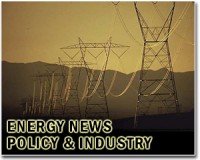 |
Berlin (UPI) Jan 19, 2011 Eon Chief Executive Officer Johannes Teyssen, the head of Germany's largest utility, said Wednesday European governments should drop national energy policies for a European one by 2020 or lose out to dynamic competitors such as China. In a speech in Berlin, Teyssen derided the sometimes conflicting national policies that he said are hurting the European energy industry's competitiveness by preventing technology advancements and slowing a necessary modernization of the continent's energy grid. "Europe should completely abolish, by the end of this decade, its different national energy policies," Teyssen said at the Handelsblatt energy conference, which runs through Thursday. "I don't see any other way to reach our ambitious targets in Europe without overburdening its economies." There are different standards for wind power technology in different European nations, Teyssen said. "The Chinese should be happy about this," he said, alluding to the increasing competition in the renewable energy sector from Chinese manufacturers in the wind and solar energy sectors. A truly European energy strategy and an integrated market, he said, would create much-needed investment security and could even be "the basis for a successful Europe." Teyssen said he expected EU ministers to re-evaluate the European Union's current energy strategy to push for more European integration at a Feb. 4 EU summit. German Environment Minister Norbert Roettgen, whose office is preparing the German position at the next summit, said he was in favor of an integrated market. "We need a European market with European targets and conditions," Roettgen said, adding that jointly developed technology efficiency standards, for example, would benefit German high-tech exporters. Roettgen has been a strong supporter of Germany's renewable energy law, the EEG, which regulates clean energy funding. If the EEG would be "Europeanized," as Teyssen has suggested, growth of Germany's domestic solar power market -- the world's largest when it comes to installed capacity -- is poised to grind to a halt (and move to sunnier regions). Germany in 2010 saw an estimated 10 gigawatts of new installations, compared to 4 GW the year before. Because the renewable energy feed-in tariff is paid by German taxpayers via their electricity bills, the 2010 solar module sales record has driven up power prices. The so-called eco-tax jumped from 2 cents to 3.5 cents per kilowatt-hour at the start of this year. As subsidies are guaranteed for 20 years, Germany faces billions of dollars in costs for decades to come. This year alone, German consumers subsidize renewables with $17.6 billion, German Economy Minister Rainer Bruederle said Tuesday at the Handelsblatt conference. A breakthrough seems imminent: Roettgen announced the industry and the government had come to an agreement on the solar subsidy cut, without providing details of the deal, to be unveiled Thursday. Solar sector lobbying group BSW earlier this month told the Berliner Zeitung newspaper it was ready to accept cuts "by up to 12 percent" as early as July. The industry has warned against more drastic cuts or even a cap, saying it could lastly damage Germany's green tech sector. One of the world's leading, the German renewable industry employs roughly 340,000 people. The EEG has boosted the share of renewables in the German power mix to 17 percent and has been emulated all over the world.
Share This Article With Planet Earth
Related Links
 EU wants Swiss in common energy market
EU wants Swiss in common energy marketBern, Switzerland (UPI) Jan 18, 2011 European Energy Commissioner Guenther Oettinger has urged Switzerland to join the EU electricity market in a bid to gain a compact consumer with large hydropower storage capabilities that could protect the European grid from outages. Brussels plans to introduce a common, liberalized power market and would like to see non-EU members Norway and Switzerland take part. Norway is a tr ... read more |
|
| The content herein, unless otherwise known to be public domain, are Copyright 1995-2010 - SpaceDaily. AFP and UPI Wire Stories are copyright Agence France-Presse and United Press International. ESA Portal Reports are copyright European Space Agency. All NASA sourced material is public domain. Additional copyrights may apply in whole or part to other bona fide parties. Advertising does not imply endorsement,agreement or approval of any opinions, statements or information provided by SpaceDaily on any Web page published or hosted by SpaceDaily. Privacy Statement |